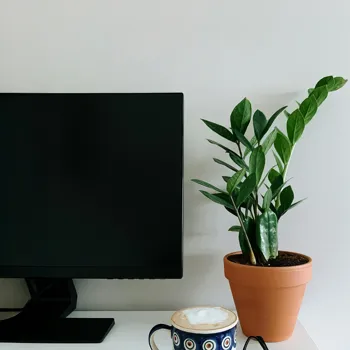Discover the Impact of Screen Time on Your Health & 8 Tips to Manage It! Dive in for a healthier digital life
Namaste, readers! In today's digital yuga, we are constantly surrounded by screens. From our
smartphones and laptops to tablets and televisions, these devices have become an integral part of our daily lives.
While they offer numerous benefits, such as easy communication, access to information, and entertainment, excessive screen time can have a significant impact on our health.
Let's take a closer look at the effects of prolonged screen usage and learn some practical tips to manage it effectively, keeping you healthy and happy.
One of the most common issues arising from too much screen time is eye strain.
Think about it: you are constantly focusing on a bright screen, blinking less, and often doing this in poorly lit environments. This leads to dry eyes, blurred vision, headaches, and even difficulties in focusing.
Also, long hours spent hunching over devices can cause neck pain, shoulder stiffness, and backaches. Maintaining a healthy posture and taking regular breaks are therefore very important.
Another concern is the disruption of sleep patterns.
The blue light emitted from screens interferes with the production of melatonin, a hormone that regulates sleep. This can make it difficult to fall asleep, leading to insomnia and poor sleep quality.
Lack of sleep can further lead to mood swings, difficulty concentrating, and decreased productivity. Therefore, winding down before bed without any devices is always a safe choice.
Tip 1: Follow the 20-20-20 Rule: Every 20 minutes, look at something 20 feet away for 20 seconds to reduce eye strain. This simple habit can significantly ease the pressure on your eyes during prolonged screen time. It’s a small action with a big impact.
Tip 2: Adjust Screen Brightness: Ensure your screen brightness matches the ambient light in your room. Too bright or too dim can strain your eyes and cause discomfort, so maintaining a moderate level is key.
Moving on, prolonged screen time often contributes to a more sedentary lifestyle. We are spending more time sitting or lying down, which reduces physical activity. This in turn increases the risk of obesity, heart diseases, and other health problems. Regular exercise and incorporating movement into your daily routine become all the more important. It also causes some psychological issues. Feelings of anxiety, depression, and loneliness can be exacerbated by excessive screen usage, especially when it replaces face-to-face interactions.
Considering this, it’s understandable why we need to be mindful of how much time we spend glued to our screens. It’s not just about the time itself, but also what we’re doing during that time.
Spending hours scrolling through social feeds or watching videos can leave us feeling drained and disconnected from the real world. So, focusing on quality, real-life connections is extremely beneficial.
Tip 3: Set Time Limits: Use built-in features on your devices to track your screen time and set daily limits. When you reach your limit, take a break or switch to a different activity. This will help you stay conscious of your usage.
Tip 4: Create a "No-Screen Zone": Designate specific areas in your home, like the bedroom or dining table, as screen-free zones. This encourages relaxation and enhances quality time with family, helping you relax better.
Now let’s think about the younger generation. Children and teenagers are increasingly spending a lot of time on screens, which is a cause for concern. Excessive screen time can negatively impact their cognitive development, attention span, and social skills. It is imperative for parents to monitor their children's screen usage and promote a balance between screen time and other activities, like playing outside or reading books.
It's important for parents to encourage their children to engage in physical activities, cultivate hobbies, and spend time with friends and family. These activities can help children develop important skills, improve their overall well-being, and reduce their dependence on screens.
Setting clear boundaries and actively participating in their children's digital lives is crucial for their healthy development. This will help them develop as well rounded individuals.
Tip 5: Take Regular Breaks: Stand up and move around every 30-60 minutes to reduce physical stress. Do some stretching exercises or take a short walk to improve circulation.
Tip 6: Use Blue Light Filters: Enable blue light filters on your devices or wear blue light glasses, especially in the evenings, to minimize the impact on your sleep cycle. This will improve your ability to sleep.
Moreover, the content we consume on screens can have a huge impact on our mental and emotional well-being. Constant exposure to negative news or unrealistic social media depictions can lead to feelings of stress, anxiety, and inadequacy. It is imperative to carefully curate the content we consume and focus on positive, uplifting material that enhances our overall well-being rather than detracting from it.
Also, we need to make sure that we are setting healthy boundaries around our screen time. This means taking breaks from our devices throughout the day, especially during meals and before bedtime.
It also means being intentional about the content we consume and avoiding anything that makes us feel stressed, anxious, or overwhelmed. You need to give it a try in your daily life.
Tip 7: Cultivate Offline Activities: Engage in hobbies, spend time with loved ones, read books, or do anything that brings you joy without involving screens. A digital detox can be highly refreshing.
Tip 8: Prioritize Sleep Hygiene: Keep your bedroom dark, quiet, and cool. Avoid using screens for at least an hour before bed to ensure a restful night's sleep, This will help your body relax properly.

In conclusion, while screens are an integral part of modern life, it is vital to manage screen time effectively to protect our health and well-being.
By being mindful of our usage habits, incorporating regular breaks, and prioritizing real-life activities, we can create a healthier and more balanced digital life. Remember, moderation is key. So, put down your phone for a bit, look around, and enjoy the beauty of the real world. Jai Hind!
AI Generated Content. Glance/InMobi shall have no liability for the content



















